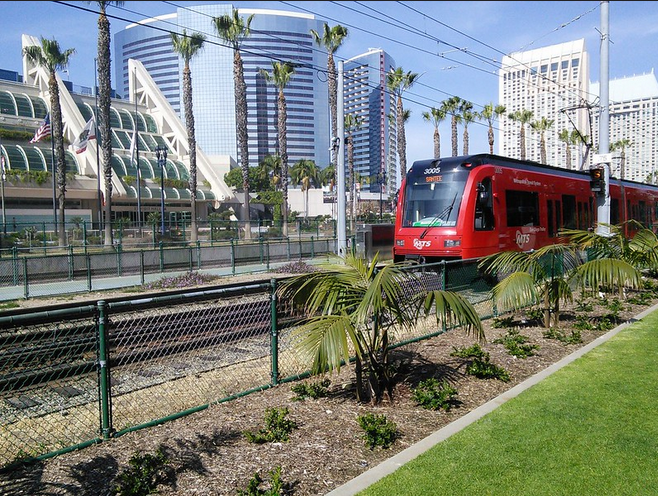Note: GJEL Accident Attorneys regularly sponsors coverage on Streetsblog San Francisco and Streetsblog California. Unless noted in the story, GJEL Accident Attorneys is not consulted for the content or editorial direction of the sponsored content.
There's lots of celebration on social media today after California Governor Gavin Newsom signed Assemblymember Laura Friedman's A.B. 2097, which will prohibit cities from setting a minimum parking requirement for developments near transit. Governor Newsom even took the time to record a short video (see below) pointing out why the bill is an important climate and housing bill.
For years, cities have required builders to including a minimum number of parking spaces in developments. Planners based the requirements on questionable assumptions, but nobody asked those questions until UCLA Professor Donald Shoup started to. In the course of his academic work, Shoup pointed out the faulty and arbitrary reasoning behind, and the many unintended consequences of, parking requirements, including driving up the cost of housing and commercial development, encouraging and even requiring driving to be the default transportation mode by assuming parking should always be available wherever one drives and increasing distances between destinations, making infill much more expensive to build, and increasing emissions.
CA is making housing cheaper & easier to build by eliminating parking requirements for new housing near transit and daily destinations like jobs, grocery stores, & schools.
— Office of the Governor of California (@CAgovernor) September 22, 2022
Thanks to the work of @laurafriedman43, we’re prioritizing people and the planet over cars. pic.twitter.com/nCURn94kqy
In a statement, Assemblymember Friedman pointed out that "mandatory parking requirements worsen California’s severe housing shortage by raising the cost of housing production. On average, a garage costs $24 -$34,000 per space to build, and an underground parking space costs $50-$65,000 to build. These costs get passed on to individuals and families, even if they don’t own or cannot drive a car. San Diego eliminated minimum parking requirements in Transit Priority areas in April 2019. In 2020, the city saw a more than four times increase in affordable housing units produced."
Note that nothing in A.B. 2097 prohibits developers from providing the parking spaces they believe are needed to meet market demand. Instead of imposing a mandatory, one-size-fits-all parking requirement, it gives developers flexibility to build projects that "meet the needs of each neighborhood and the specific demographics of each project," according to the bill's author.
Note also that this doesn't apply solely to new development, but to adaptive reuse as well. So if a restaurant, say, wants to move into an old building near transit, a city can't force it to build more parking or refuse its permit on the basis of parking requirements.
While some cities have already started down this road - San Diego, notably, as well as in some transit priority areas in Los Angeles - making this a statewide policy is groundbreaking and much needed.
But the length of time and amount of work it took to get here should be cause for concern. The bill had a long list sponsors and supporters, many of whom have done extensive work on the subject for years. They include SPUR, Abundant Housing LA, Bay Area Council, California YIMBY, the Council of Infill Builders, and numerous academic researchers including Professor Shoup, Michael Manville, Ethan Elkind, Patrick Seigman, and many others who have been preaching parking reform for many years.
Two down and 48+DC to go!
— Parking Reform Network (@Parking_Reform) September 23, 2022
Congratulations to all the folks in California that made #AB2097 possible!
But the work isn't done and parking reform is more than minimums. Join the Parking Reform Network and let's make this happen everywhere https://t.co/tiVc49kbE9 pic.twitter.com/VD24d7JPvE
So celebrate this win, but also be reminded that it is only a first step. More needs to be done to encourage both more transit-oriented development and better transit everywhere, and not just in California. Climate change and its consequences are hurtling towards us, and this victory, while it is a big deal, is also quite small in the face of what needs doing, sooner.






